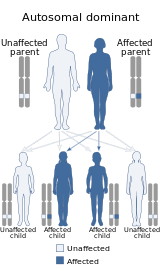Keppen–Lubinsky syndrome
| Keppen–Lubinsky syndrome | |
|---|---|
| Other names | Generalized lipodystrophy-progeroid features-severe intellectual disability syndrome |
 | |
| This condition is inherited in an autosomal dominant manner | |
Keppen–Lubinsky syndrome is an extremely rare congenital disorder. The minimal clinical criteria for the Keppen–Lubinsky syndrome are as follows: normal growth parameters at birth, postnatal growth failure, peculiar face with an aged appearance (large prominent eyes, a narrow nasal bridge, a tented upper lip, a high palate, an open mouth), skin tightly adherent to facial bones, generalized lipodystrophy, microcephaly, and development delay.[1][2][3] Keppen-Lubinsky syndrome is caused by mutation in the inwardly rectifying K+ channels encoded by KCNJ6 gene.[4]
References
- ^ Gorlin, Robert; Cohen, M. Michael; Hennekam, Raoul (2001). "Syndromes of the head and neck". Keppen–Lubinsky syndrome (4th ed.). New York, U.S.: Oxford University Press. p. 1179.
- ^ De Brasi, D; Brunetti-Pierri, N; Di Micco, P; Andria, G; Sebastio, G (2003). "New syndrome with generalized lipodystrophy and a distinctive facial appearance: confirmation of Keppen-Lubinski syndrome?". American Journal of Medical Genetics. 117A (2): 194–5. doi:10.1002/ajmg.a.10936. PMID 12567423.
- ^ Basel-Vanagaite, Lina; Shaffer, Lisa; Chitayat, David (2009). "Keppen-Lubinsky syndrome: Expanding the phenotype". American Journal of Medical Genetics. 149A (8): 1827–9. doi:10.1002/ajmg.a.32975. PMID 19610118.
- ^ Masotti, Andrea; Uva, Paolo; Davis-Keppen, Laura; Basel-Vanagaite, Lina; Cohen, Lior; Pisaneschi, Elisa; Celluzzi, Antonella; Bencivenga, Paola; Fang, Mingyan (2015-02-05). "Keppen-Lubinsky Syndrome Is Caused by Mutations in the Inwardly Rectifying K+ Channel Encoded by KCNJ6". The American Journal of Human Genetics. 96 (2): 295–300. doi:10.1016/j.ajhg.2014.12.011. ISSN 0002-9297. PMC 4320262. PMID 25620207.
External links
